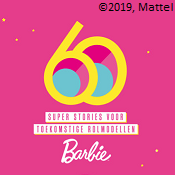Tromp: "Diversity pays off"

Zernike member Prof. Dr. Moniek Tromp is featured on the cover of the VNCI Chemie Magazine. In the feature article, she and two colleagues share their experiences with diversity on the workfloor. Additionally, she is presented as a role model for Dutch girls and women by no other than Barbie in honour of 60 years of the toy. The Zernike institute is proud of Tromp's efforts to promote diversity even from a young age, in addition to her scientific accomplishments. You can find Tromp's feature in the Barbie book here.
You can find the full magazine article (in Dutch) through this page: https://www.vnci.nl/nieuws/nieuwsbericht?newsitemid=4235034628.
Diversiteit loont’
Source: Chemie Magazine, VNCI, auteur Klaartje Jaspers. Automatically translated into English using DeepL
Moniek Tromp, Professor of Material Chemistry at the Zernike Institute for Advanced Materials at the University of Groningen. She is working on batteries and catalysts that are needed to achieve the energy transition. "I find the idea that women would have different qualities difficult, but diversity in the workplace pays off. Not only in terms of gender or gender, but also in terms of age, culture, experiences: the more information, the more backgrounds a group has, the more creative it is. You can come up with really new ideas more quickly and with the problems we now face in the field of sustainability and the energy transition, we really need very creative ideas.
You sometimes hear that as a woman you have to stand 'your man' to work in technology, but men also have to work hard and be known in 'the circle' to get something done. I stand out more in a room with 29 men in blue suits. That can also be an advantage: afterwards I may no longer know who they are, but everyone knows who I am. Students sometimes fear that they would have to prove themselves constantly in this world. I don't feel that way myself, but I do understand that idea. A lot of research has also been done on it: academic papers, for example, are judged very differently if there's a woman's name above, than if there's a man's name.
You could give gender bias courses where everyone has to go: men and women, because they are also biased. Men often think they understand, but in practice it works very differently. Moreover, the entire application process should be very transparent, and there should be more women in the committees. In Germany, I was asked so often for this that I could hardly get on with my own work.
In addition, think of measures that apply to everyone: also offer senior positions such as a four-day working week, and give people the opportunity to organise their times flexibly. Then partners can take joint responsibility for the family and support each other in their ambitions. Ultimately, the lack of diversity in chemistry is a common problem that we must solve together.
I used to say: 'I would not like to be hired because I am a woman, but because I am good'. However, a German top woman pointed out to me that a quota gives women the opportunity to show that they can do it. To break open the existing culture, you seem to need 20%. That gives you the support you sometimes need, and you have to learn to accept it. For example, I once sat in a meeting with a child at the chest, and a cloth over it. I gave them the choice: 'I am here with a child, or I am not here'. Two men walked away, but the majority of those present understood and accepted it.
Starting at primary school
Besides her work at the Zernike Institute, Tromp teaches at the University of Amsterdam and teaches at various primary schools. You have to tell children at a very young age that girls can also become firefighters or chemists, Tromp knows: gender stereotyping starts at the age of 5 or 6. Not approaching girls until they are in high school is therefore much too late. Initiatives such as 'Image Breakers' bring new thoughts to both girls and their parents. vhto.nl/projecten/beeldenbrekers
More news
-
15 September 2025
Successful visit to the UG by Rector of Institut Teknologi Bandung
